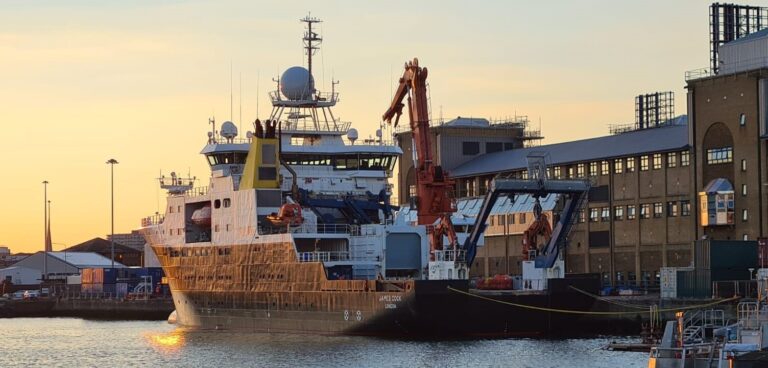The UK’s National Oceanography Centre (NOC), home to RRS James Cook and RRS Discovery, is managing 31 global research missions in 2023, providing a wealth of support for international research institutions.
This will include missions to the Bay of Biscay where NOC’s Marine Autonomous Robotic Systems team will trial its fleet of AUVs and gliders to test autonomous ocean research capabilities; an expedition to quantify deep sea ecosystem resilience in the Pacific; and a research mission to Norway to study the role nitrogen plays in Arctic biogeochemistry.
This year’s missions already include the DY158 expedition which took place earlier this year and circumnavigated the A76a megaberg. Led by British Antarctic Survey (BAS), the Southern Ocean expedition included the supply of 22 NOC crew plus six NOC technicians to provide underwater sensor technology and facilitate data gathering, while BAS provided the scientific expertise to understand the long-term variability in krill biomass and the influences from climate variability, fishing pressure and predation.
Jon Short, senior project manager at NOC, said, “We ensure that the vessels are capable of performing the science operations required for all research missions, alongside certifying the required equipment and operating state of the art technology safely, efficiently and optimally. NOC’s involvement in circumnavigating the A76a iceberg highlights the key role the NOC’s technicians, alongside the captain and crew on board the RRS Discovery, play in providing data to support important scientific research expeditions.”
NOC’s technological equipment supports ocean research missions, including sampling instruments which provide real-time data from the sea surface, collating data relating to temperature, salinity and fluorescence, which is used to validate weather and climate models. Alongside this, NOC provide real-time atmospheric data, such as air temperature, wind speed and direction, and light measurements.
Short continued, “This kind of data collection is the fundamental backbone of all science research and forms the basis of the vast majority of papers that will come out of this or any other research cruise.”
Eleanor Darlington, head of marine facilities programs at NOC, said, “The ships we operate are integral to the world’s capabilities in ocean science, and one of the ways we showcase our dedication to the field of ocean research is by partnering with UK businesses to provide safe and ground-breaking operations to help us harness the value of the ocean, as well as protect and restore it.”



